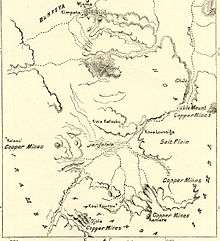Copper in Africa
Copper is one of the world's most important industrial minerals, and Africa is an important world producer. While output is traditionally dominated by Zambia, South Africa and Katanga Province in the south of the Democratic Republic of the Congo, many African nations contribute to copper production, and many African nations have undeveloped ore resources.
Cobalt, another important industrial metal, is often mined in conjunction with copper.
Okiep copper mine, South Africa
Zambia
Nchanga copper mine, Zambia
- The Copperbelt
- Copperbelt Province
- Lumwana – Equinox Minerals [9]
- Luanshya Copper Mine Company – Baluba – Mulyashi copper project [10]
- Mkushi – African Eagle Resources [11]
- Zambia Consolidated Copper Mines
- Zambia Copper Investments Limited – Konkola Deep Mining Project – symbol ZCI on the Johannesburg Securities Exchange
gollark: But yes, I agree utterly, most copy protection stuff bad, I would go for at most having asymmetric-cryptography-verified license keyoids.
gollark: Sounds backdoory.
gollark: Especially as my server only has about 99% uptime.
gollark: You *could* just use *asymmetric* apiocryptography probably maybe? Requiring an internet connection to use it is VARIOUSLY apioformic.
gollark: What is this actually *4*?
See also
- Copper extraction techniques
- List of countries by copper mine production
- Mineral industry of Africa
- Economy of Zambia
- Aluminium in Africa
- Cement in Africa
- Iron ore in Africa
- Platinum in Africa
- Titanium in Africa
References
- Botswana: African Copper Needs $15 Million to Stay Afloat, AllAfrica, 19 December 2008
- African Business, March 2010, p67
- Base Metals Archived 2008-06-02 at the Wayback Machine. Mme.gov.na. Retrieved on 2011-05-27.
- Palabora Mining Company – Home. Palabora.co.za. Retrieved on 2011-05-27.
- Rio Tinto Copper Mine, Palabora, South Africa. Mining Technology. Retrieved on 2011-05-27.
- Aanyu, Rehema (22 August 2013). "Exploring My Uganda: The Kilembe Mines". New Vision (Kampala). Retrieved 3 June 2015.
- www.miningreview.com | Kilembe copper mines may re-open Archived 2011-07-14 at the Wayback Machine. Beta.miningreview.com (2008-10-24). Retrieved on 2011-05-27.
- www.miningreview.com | First copper concentrate at Lumwana Archived 2011-07-14 at the Wayback Machine. Beta.miningreview.com (2008-12-08). Retrieved on 2011-05-27.
- Reuters.com. Africa.reuters.com (2009-02-09). Retrieved on 2011-05-27.
External links
This article is issued from Wikipedia. The text is licensed under Creative Commons - Attribution - Sharealike. Additional terms may apply for the media files.
